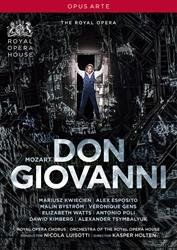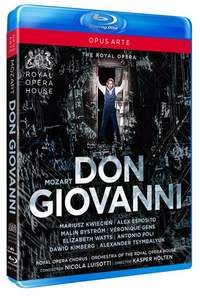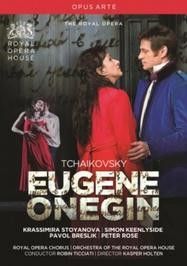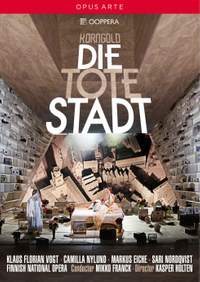Interview,
Kasper Holten on Don Giovanni
 The title 'Director of Opera' at Covent Garden has often been open to misinterpretation - previous incumbents from artist-management, casting and arts administration backgrounds have fulfilled their duties in the role without doing any actual 'directing' in the theatrical sense. Not so Kasper Holten: since taking over the role in 2011, the Danish director (whose credits elsewhere include Juan, an English-language film of Don Giovanni which draws heavily on contemporary cinema such as Traffic and the Bourne Trilogy) has staged his own new productions of Eugene Onegin and Don Giovanni, with Szymanowski's Król Roger planned for 2015.
The title 'Director of Opera' at Covent Garden has often been open to misinterpretation - previous incumbents from artist-management, casting and arts administration backgrounds have fulfilled their duties in the role without doing any actual 'directing' in the theatrical sense. Not so Kasper Holten: since taking over the role in 2011, the Danish director (whose credits elsewhere include Juan, an English-language film of Don Giovanni which draws heavily on contemporary cinema such as Traffic and the Bourne Trilogy) has staged his own new productions of Eugene Onegin and Don Giovanni, with Szymanowski's Król Roger planned for 2015.
That recent Don Giovanni was, for me, one of the highlights of the 2013-2014 season: throwing fascinating new light on the relationships between the characters, its impact was unforgettable for Es Devlin's M. C. Escher-inspired sets and for a final coup de theatre which was devastating in its very understatedness. Now available on Opus Arte on DVD and Blu-ray, Holten's production was broadcast live into cinemas worldwide and later on BBC2, and will be revived in June 2015, with a cast including Christopher Maltman, Julia Lezhneva, Dorothea Röschmann and Rolando Villazón.
Amid the whirlwind of activity surrounding the opening of the new season and in particular the revival of Mark-Anthony Turnage's Anna Nicole, Kasper spared a few minutes to answer some questions about this Don Giovanni - in particular about those elements which generated a certain amount of controversy when it first opened…
The majority of recent productions have set the opera either at the time of its composition or in the present day: what sparked your decision to go for a nineteenth-century setting?
We wanted to explore the idea of sexuality, imagination and seduction in an era which is known for being quite prude and uptight. If you start off in a modern setting with girls in bikini and sex on display everywhere, where do you go from there? I had already explored a contemporary take on the story in an earlier production and in my film. Also, girls in bikini are often surprisingly unsexy on stage, so we wanted to create a universe, where it would be sexually explosive if he even just took the glove off a woman and touched her skin. With a lot of repressed and pent-up emotions boiling under the surface, but still hidden away as we start.
Your 2010 film Juan couldn’t, on the surface, be more different from the Royal Opera Giovanni – but were there any aspects of Juan which you carried over into this production?
It is funny you say that. I find they have a lot in common. Obviously when you do a new production you want to explore new aspects of a masterpiece – they are indeed that, masterpieces, as they can really be read in many different ways – but a lot of my basic feelings about the characters are carried forward, I think. More than anything I think the idea that loneliness is really what defines the character of Don Giovanni is something I tried to explore both in the film and in the production. But you must use very different tools obviously. A car chase would be hard to pull off on stage, but then again the beautiful thing about theatre is that in some ways much more is possible than on film, as it demands that the audience makes use of their own imagination to fill in the picture.
How did the Escher connection arise? Was this something you had in mind from the beginning, or did it evolve further down the line in discussions with Es Devlin?
Such a thing for me always arises out of a search process and never comes first. Es and I found out that for us it was about a man who is seemingly always moving forward, but who actually turns out to be going in circles – unable to escape himself. And we liked the idea of a labyrinth, where both he and others could lose themselves. But in fact the actual set design only took shape very, very late in the process after many more iterations. We wanted to explore the idea of imagination: a set which represents reality, but which is also – literally – a canvas on which Giovanni can paint, with ideas, with words, with fantasies. And we wanted to have a theatrical playground with all the necessary doors, corners, staircases and levels to make the comedy aspects of the piece really work: to avoid someone obviously seeing what they shouldn’t see, and asking the audience to accept that. And to avoid someone saying they are trapped, when they can obviously just walk off in any direction.
One of the most controversial aspects of the production was its depiction of the women, with both Zerlina and Donna Anna crying rape rather than being portrayed as genuine victims: how does this change the dynamic of the opera, and what in particular in the libretto/score set you on this track?
More than anything, it was because I find it very hard to imagine Giovanni as a rapist: If he is, I simply lose interest in him. He is then just a despicable human being, who should be sent to jail, and why play a three hour opera about him and his inner life. We can have no sympathy, no identification. Rape is only sick and wrong, nothing more to say. I also think Mozart’s music contradicts the idea that he is a rapist. What interested me was a man who could seduce, not one who used physical force. But it also has the effect that the women become more active and must take part of the blame. Some people found that misogynist. I disagree. Treating women on stage only as innocent, naive victims is misogynist to me. Treating them as real human beings who are wonderful, but who also lie and do bad things and end up in a mess, that I find is just part of treating them like all characters on stage: as complex human beings. Goodies and baddies are not labels that interest me.
The opera’s famously described on the title-page as a ‘dramma giocoso’ – how did you balance the tragic and comic elements, and which (if any) do you feel dominates?
Both must work, or a production can never do the work credit. We tried to create a world, where comedy was a real possibility, and not make the heavy. But it is clear that in the end, it is also a tragedy and unless Giovanni’s fate somehow makes an impact on us, I think you miss a very important aspect of the work.
Tell us a little about the ending: there’s no hellfire (and no ‘Ah, dov’e il perfido?’!) in your production, in stark contrast to the previous ROH Giovanni. What was the dramatic reasoning behind the cut, and what really constitutes hell for this particular Giovanni?
It simply doesn’t seem very scary with literal hellfire to me. If I wake up at 3am and feel alone and afraid, it isn’t flames I am thinking of. But loneliness and the idea that all my efforts, everything I tried to do with my life, ends up just disappearing, that it was all meaningless and in vain. And that I will die alone. That would be the fate for someone who wants to have everything and complete freedom: freedom also means freedom from other people. So our Giovanni ends up alone, he has burnt all bridges, even to Elvira and Leporello, and now there is only him and the ghosts that won’t leave him alone, the memories of what he did to other people – and himself. And he then understands that all his efforts were meaningless, all his ideas, his illusions, his collection of possible lives, all just fades away and was nothing. THAT is what makes me afraid.
As far as we know, Mozart himself tried a short and long version of the ending. We wanted to try a new version, where we go directly to the condemnation he must live with, but we stick with our focus on his destiny and have cut much of the stuff about what the other characters will do now. In our version at this point that did not seem like the right focus. Many people found the cut very controversial - “you cannot cut Mozart”. But we cut Mozart all the time, it is just that we have these strange, unwritten laws about what you can and cannot cut. We owe it to the piece each time to try to make the choices that makes it the strongest statement for the audience, musically and dramatically. And given that Mozart himself probably made an even bigger cut to the ending when he brought the piece to Vienna seems to me to indicate that the ending of Don Giovanni is not more ‘sacred’ than other bits that we choose to cut or include.
Don Giovanni is out now on Opus Arte; the cast includes Mariusz Kwiecien as Giovanni, Alex Esposito as Leporello, Malin Byström as Donna Anna, Véronique Gens as Donna Elvira, and Elizabeth Watts as Zerlina; Nicola Luisotti conducts.
Available Format: DVD Video
Also available on Blu-ray.
Available Format: Blu-ray
Other productions by Kasper Holten
Holten's first production as director the Royal Opera House (a role which he took over in 2011) stars Krassimira Stoyanova and Simon Keenlyside as Pushkin's star-crossed lovers and tells their story in flashback, using dancers to portray the characters' younger selves.
Available Format: DVD Video
Klaus Florian Vogt and Camilla Nylund are luminous leads in this 2010 production from the Finnish National Opera Korngold, Holten's direction was praised for its 'wonderfully creepy' (The Guardian) evocation of the 'Dead Town' of the title, whilst BBC Music observed that 'He allows the drama...to shine'.
Available Format: 2 DVD Videos






